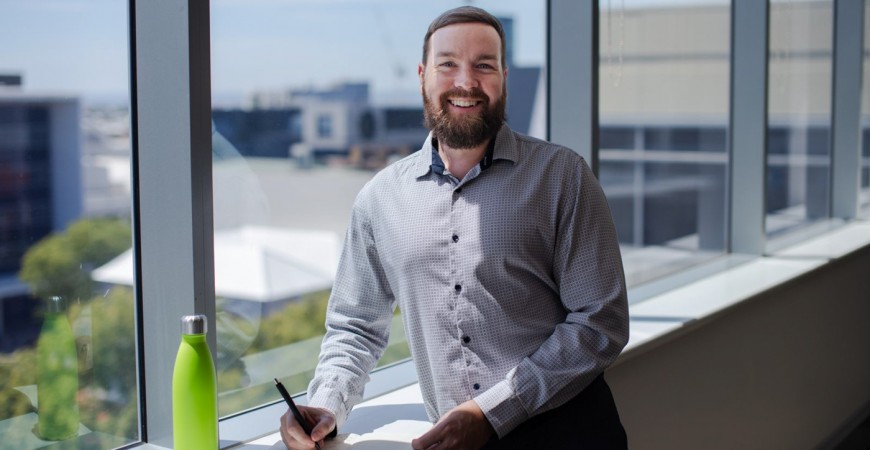A young Colin Davies could often be found developing some new concoction from things he had found around the house.
Growing up in Manchester, he had shown an interest in science, particularly chemistry, from an early age and would often use the cupboard under the stairs at his friend’s house as a makeshift science lab.
From a hard-working family to ReGen Strategic’s General Manager of Sustainability and ESG, Colin never would have guessed where his early experiments and passion for science would lead.
His career has seen him travel the world and work on projects for some of the world’s largest international financial institutions (IFIs) such as the World Bank, International Finance Corporation and European Bank for Reconstruction and Development.
“They’re the ones that coined the term ESG,” he says.
“I’m extremely proud to have been a part of those projects, especially those in less developed countries, that have actually improved the living standards and provided access to cheaper natural gas resources.”
While Colin has always shown a passion for science, he didn’t become interested in sustainability until he was in college.
“It was a particular lecturer in the environmental science classes that really instilled the first thought that I could actually pursue a career in environmental science and sustainability,” he reflects.
After studying an undergraduate degree in Environmental Science, Colin accepted his first environmental role working in a dedicated dioxin and furan laboratory.
“Dioxins and furans are persistent environmental pollutants that are exceedingly toxic to both the environment and human health. Preparation of samples for analysis was very precise considering the low concentrations of dioxins and furans that needed to be detected.”
After several years in the lab, Colin wanted to pursue bigger opportunities, so he packed up his bags and moved to Australia after accepting a fly in fly out position as an environmental advisor in an engineering firm.
While many may find the proposition of moving daunting, Colin says the transition was seamless.
“I wanted to broaden my horizons and apply the things that I'd learnt and everything that I was interested in,” he says.
“After being office based, I then went fly in fly out, so what better way to immerse yourself into the Australian culture.
“I learnt everything really quickly to hit the ground running, I didn’t have time to really think or process things.
“I even spent some time in the rheology laboratory applying the skills I had learnt in the past.”
To further support his career development, Colin also went on to study a Master of Science in Environmental Management and Sustainable Development which he credits as the gateway into working with IFIs where he put his knowledge of sustainable development principles to the test.
During this time, Colin has been fortunate to work on projects across the globe.
Of all the places he’s travelled to, Colin says Mongolia was his favourite.
“For me, that's a real standout moment in my career, as well as traveling to places like Turkey and Romania, and doing projects all over the world. I never would have expected that,” he says.
“When I was thinking about a career in science when I was a child, I really thought it could only be lab based, but I've travelled all over the world and worked on some incredible projects in developing countries with the aim of reducing poverty, increasing shared prosperity and promoting sustainable development.
“I'm very proud of the things that I've achieved already. I've got lots of my working career left, so I want to instil my passion into other people and let them understand what they can achieve and how they can contribute to sustainable development as well.”
While Colin admits he hadn’t heard too much about ReGen Strategic when he first applied for the position, he says he was impressed with the business’s offerings.
“I looked at their [ReGen’s] existing skills, and they were more mature in their social services like stakeholder engagement and community engagement and also communications,” he says.
“And I personally recognise the importance of the role they play in sustainability and how communicating with your stakeholders and understanding what’s important to them is critical to absolutely everything.
“When I thought about all of that, and how we could package it up and integrate it, how powerful that could be. It was different, and it was quite unique.”
Over the course of his career, Colin has witnessed the world’s changing attitude towards sustainability. However, he describes the change as slow with a lot of people only just starting to realise the importance sustainability can play.
“As we start to see mandatory reporting requirements come in, and people understand the importance of being able to demonstrate positive sustainability impacts and how they're actually being asked as part of loans or finance or funding or as part of procurement opportunities to demonstrate your credentials, the attitude is now slowly starting to change,” he says.
“Whilst that's positive, that's not at the heart of what the notion of sustainability is, so your heart has got to be in the right place and you need to have the right sentiment, you've got to understand that it means certain things to certain people and those things can vary.”
Colin has always believed in delivering a sustainable outcome for generations to come, but since he has had kids, his work now carries greater meaning.
“Everything I do is important for my kids, and I want them to appreciate the world as much as we do, but I think I've always felt that way,” he explains.
“Even the small things that we do, can lead to big changes. I also want to set an example for my kids. I like to instil those values in my kids that if you work hard, and you put the effort in, the reward will be commensurate with that.”
 ReGen Strategic
ReGen Strategic